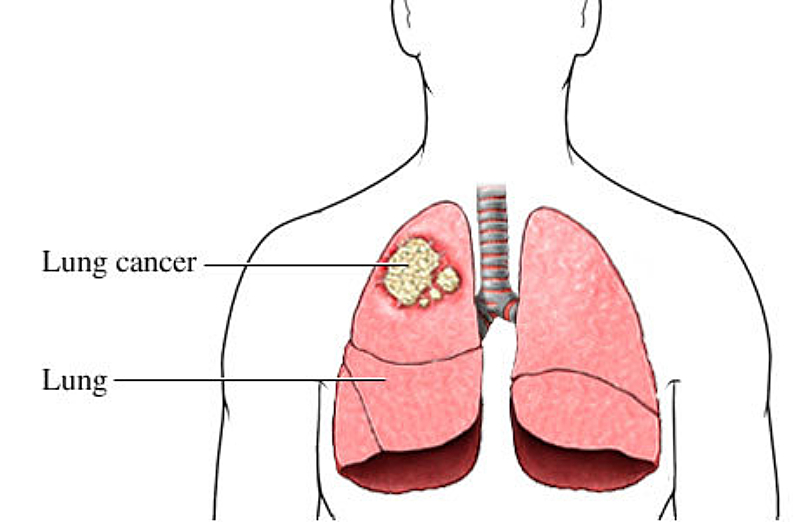Our bodies are made up of tiny cells, which normally repair and reproduce themselves. Sometimes, however, they develop in an abnormal way forming lumps or tumours. Lung cancer is cancer of some of the cells in part of the lungs, usually beginning in the lining of the airway.
Illustration courtesy of webmd.com
Primary lung cancer is cancer that originated or started in the lungs. Secondary lung cancer is cancer that has started somewhere else in the body (bowel or breast for instance) and spread to the lungs.
The most common cause of changes to cells in the lung is inhalation of tobacco smoke. However, exposure to asbestos, marijuana smoke, and a number of other chemicals can also cause people to develop lung cancer.
Cigarette smoking is the major cause of lung cancer but it is not known why some smokers develop lung cancer while others do not. Up to 90% of lung cancer is caused by smoking. There is also increasing evidence to suggest that environmental tobacco smoke (passive or second-hand smoke) can bring about disease in children and non-smokers.
Lung cancer is the most common cancer in New Zealand men, and the second most common in women. Twice as many men as women die from lung cancer.
Signs and symptoms
Common signs and symptoms of lung cancer include:
- a cough that doesn’t go away and gets with worse time
- constant chest pain
- coughing up blood
- new onset of shortness of breath, wheeze, or hoarseness
- loss of appetite and/or weight loss
- tiredness
- fever without a known reason
- repeated bouts of bronchitis or pneumonia
- sometimes swelling in the face or neck
These symptoms can also be caused by conditions other than lung cancer. It is important to check with your doctor.
How is it diagnosed?
A diagnosis of lung cancer usually depends on a number of tests:
- Chest X-ray: Abnormal spots in the lungs can be detected. A CT scan may also be requested.
- Sputum test: This checks for abnormal cells in the lungs.
- Bronchoscopy: A flexible tube is inserted down the windpipe to look into the airways. A biopsy can be taken at the same time.
What are the treatments for lung cancer?
The individual will need to be assessed by their doctor to determine the type of treatment that is best for them. Depending on the type of cancer and the extent of its spread, surgery might be an option. An operation is not always possible however, so radiotherapy and sometimes chemotherapy are used.
Surgery
The type of surgery depends on the size and location of the tumour.
- Radiotherapy: Sometimes referred to as radiation therapy. This is a form of high energy X-ray that kills cancer cells. It is often used in combination with surgery and chemotherapy.
- Chemotherapy: The use of drugs that are effective against cancer cells. Chemotherapy may be injected directly into a vein or taken by pill.
The aim of treatment is to keep the person as well and symptom-free as possible, even if the cancer cannot be cured.
Can lung cancer be prevented?
More than 85% of lung cancers are related to tobacco smoke. If you are a smoker, stop smoking. If you are a non-smoker, make your home and work environments smoke free if possible. Don’t start smoking – smoking increases your risk of developing many types of cancer. The risk of lung cancer for ex-smokers will decrease with time, however there is still a higher than normal risk even after ten years of not smoking.
If you are exposed to dust and fumes at work ask questions about how you are being protected.
For the latest statistics on lung cancer in New Zealand, click here.



